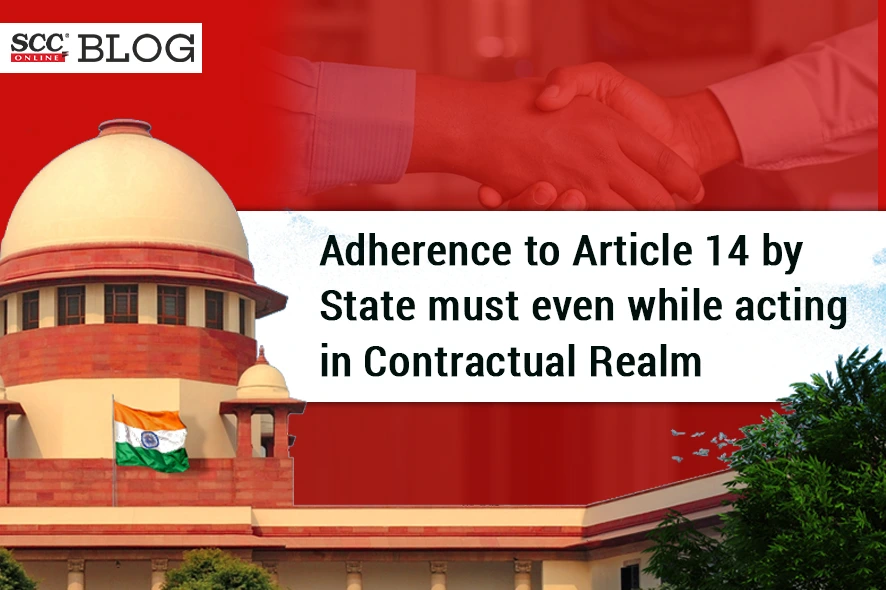Supreme Court: In a batch of civil appeals against the Judgment and Order of the Madras High Court, the three Judge Bench of B.R. Gavai, Sanjay Karol* and Aravind Kumar, JJ., said that the State must abide by Article 14 of the Constitution of India even if its action was in the contractual realm.
Background
The Madras Aluminium Co. Ltd. (‘Appellant’) was set up for manufacture of aluminium, which is a power and electricity intensive process. With the passage of time, it was declared a ‘sick industrial unit’ as per Section 3(1)(O) of the Sick Industrial Companies Act, 1985 by the Board for Industrial and Financial Reconstruction (‘Board’) vide order dated 08-09-1987. In 1994, the present management approached the Board with a plan for revival, pursuant to which a fresh scheme with certain additional concessions was issued in terms of the Government Office Memoranda. Originally, the maximum demand for electricity of the Appellant’s plant as per the agreement was 67000 kilovolt amperes (‘KVA’). Vide agreement dated 03-05-1994, the contracted maximum demand was reduced to 23000 KVA. The Appellant then made a further request on 24-12-2001, to reduce the contracted maximum demand to 10000 KVA with effect from 27-01-2002, along with an offer to pay the one-time charge payable on effecting such a reduction. Despite such request being made and some initial communication, no steps effectuating such request were taken by the Tamil Nadu Electricity Board (‘respondent’). Therefore, the Appellant was being forced to pay as per the contracted demand of 23000 KVA @ 320 Rupees per KVA. Thereafter, previous concessional power tariffs were withdrawn, and repeated high value demands were made apart from the amount of 78,00,000 already paid on 25-05-2002, this forced the filing of the petitions before different fora.
The Impugned Judgment held that it was not open for the Appellant to pay lesser charges than that of the contracted demand in absence of a sanction in respect thereof by the board. It was further held that simply because the board took time in consideration of the application of the Appellants, this would not enable them to begin automatically paying a reduced amount. It was further observed that the manner in which the Appellant’s application was considered was not arbitrary or unfair and that interpretation of such an agreement could not be undertaken in writ jurisdiction.
Court’s Decision
The Court noted that the parties on either side had urged that a unilateral decision was taken. The Respondents contend that the Appellant had unilaterally amended the contract to reduce the maximum demand to 10000 KVA when no such decision stands taken by them. The Appellant, per contra, contended that the unilateral decision on the part of the board not to act on the application submitted by them had caused prejudice to them. The Court said that it is a settled principle of law that a contract cannot be amended unilaterally. The Court referred to Ssangyong Engg. & Construction Co. Ltd. v. NHAI, (2019) 15 SCC 131, wherein, it was observed that “a unilateral addition or alteration of a contract can never be foisted upon an unwilling party, nor can a party to the agreement be liable to perform a bargain not entered with the other party. Clearly, such a course of conduct would be contrary to fundamental principles of justice as followed in this country.”
The Court said that the Appellant in pursuance of the reduction of maximum demand made its application and followed up repeatedly with the authorities. Except for two letters on behalf of the Board, no other communication on part of the board was made. The Court also said that there was no reason given as to why the application required such a vast length of time to be acted upon. Moreover, in the mean while the Appellant had faced the threat of disconnection of electricity, and had to pay, due to such inaction, large amounts of money for electricity which it had not utilized. It is true that the agreement states that the consumer, (Appellant) was bound to pay such maximum demand amount irrespective of utilization and also that such an agreement will be in effect for a period of five years but the Board could be allowed to take refuge of these clauses while the company on the other side is saddled with heavy cost in the interregnum of such decision. To answer the question that whether such an action of the application remaining pending for an unreasonable period could in itself be classified as an arbitrary and unreasonable act, the Court referred to several case laws wherein it is a well settled principle that State action irrespective of being in the contractual realm must abide by Article 14 of the Constitution of India. Therefore, keeping in view the said legal principle, the Court said that after passage of a considerable period of time, the Appellant was unjustifiably asked to furnish costs for unutilized electricity which, in any case should not have extended beyond the period of six months, thus, rendering such action unquestionably unreasonable and arbitrary. Further, the Court said that acknowledging the financial health of the Appellant, in the 1999 agreement, the Respondent ought to have taken a decision on the Appellant’s request with a reasonable period and terms and not two and a half years as was so eventually done.
Thus, the Court allowed the appeal and set aside the Judgment of the High Court. The Court also directed the Respondent to return the amount as may be calculated and verified, paid by the Appellant to it for 13000 KVA, in excess to its request of maximum sanctioned demand of 10000 KVA, within two months from the date of Judgment.
[Madras Aluminium Co. Ltd. v. T.N. Electricity Board, 2023 SCC OnLine SC 783, Decided on 06-07-2023]
*Judgment Authored by: Justice Sanjay Karol
Advocates who appeared in this case :
For the Appellants: Advocate Binu Tamta;
For the Respondents: Advocate Vinodh Kanna B.







